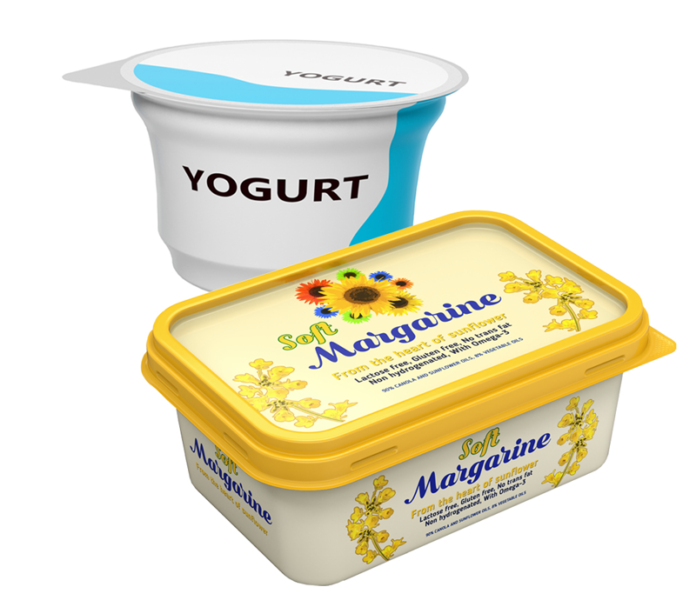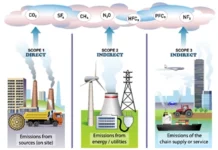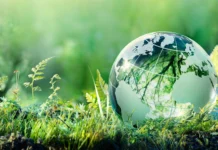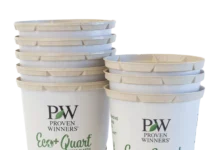by Liz Stevens, writer, Plastics Decorating
Sustainability has been a trend for American consumers since the 1970s when the magazine Mother Earth News began publication, and when composting and Birkenstocks caught on in the US. Fifty years later, sustainability and recycling in consumer goods manufacturing and packaging are big and only getting bigger in the US and across the globe. Within the plastics packaging and decorating sector, there are plenty of initiatives and innovations. Here are a few of them.
Big consumer brands leading the way
Among the big food, beverage and cosmetics makers, and the giant retailers like Walmart and Target, there is increasing pressure for products that are produced and packaged with sustainability in mind. The big guys are responding with a variety of programs and initiatives.
At the start of 2020, Nestlé S.A., the largest food company in the world, committed up to CHF 2 billion (roughly $2.24 billion US dollars) over the next few years toward creating a circular economy for plastics, reducing its use of virgin plastic in packaging and funding environmental cleanup efforts.
Acknowledging that food-grade plastic packaging is difficult to recycle and that it is therefore in limited supply, Nestlé is leading the charge toward recyclables by working on sourcing and investing in millions of metric tons of food-grade recycled plastics.
Nestlé also conducts research at its own Institute of Packaging Sciences and is exploring new materials, refill systems and recycling solutions. In addition, the company has promised to invest CHF 250 million ($280 million USD) in start-up companies that focus on sustainable packaging.
Cosmetics giant L’Oréal has joined the US Plastics Pact, an organization of more than 60 major brands, retailers, government agencies and more, committed to creating a circular economy for plastic in America. As a member of the organization, L’Oréal USA aims to make all of its plastic packaging reusable, recyclable or compostable by 2025.
Danielle Azoulay, head of customer service representative and sustainability at L’Oréal USA, stated that the company is committed to doing its part while acknowledging that its own global sustainability commitment, L’Oréal for the Future, which launched in 2020, “will reach its full potential through collaboration – across our entire value chain, our industry and beyond it.”
While L’Oréal’s first sustainability and environmental impact program focused on its direct impact, L’Oréal for the Future will tackle its indirect, extended impact, including, for example, the activity of its suppliers and the use of its products by consumers.
The Coca-Cola Company calls its sustainability strategy “World Without Waste,” and its goals include creating closed loop systems, extracting maximum value from materials and products, and recovering and recycling packaging. The company boasts that 88% of its packaging is recyclable and that 20% is made from recycled materials.
Coca-Cola has rolled out 100% recycled PET (rPET) plastic packaging in 18 markets. The Netherlands and Norway recently became the second and third markets in Western Europe (after Sweden) to transition to 100% rPET for their entire portfolios.
Recently, in order to boost the recyclability of its Sprite bottles in Southeast Asia, Coca-Cola made a dramatic packaging shift. In place of the usual green PET bottles for the lemon-lime drink, which was introduced in the 1960s, Sprite now is packaged in clear PET bottles that are far easier to recycle than colored PET. The company has made the same change in Western Europe.
The big retailers also are setting new standards that packaging printers are obligated to meet. Target, for example, uses the EPA’s Greener Living Sustainable Packaging Program as its standard for avoiding the use of chemicals of high concern in packaging and for increased use of recycled or renewable content. At Walmart, the call is for safe, affordable, recyclable and optimized packaging that includes sustainable materials.
Sustainability players in the supply chain
It is not just the big retailers that are seeking advancements, nor just the titans of edibles and cosmetics that are tightening up their production processes and revamping their product lines. Substrate manufacturers, pigment and ink producers, and labeling/packaging makers now are among industry’s sustainability and recycling champions.
Verstraete IML, a Belgium-based company, take sustainable development very seriously. In addition to optimizing its own operations for sustainability and to minimize waste, Verstraete’s in-mold labels and packaging – for injection molding, blow molding and thermoforming – are made of fully recyclable material. The company’s SealPPeel product – a container lid made of diecut mono polypropylene, recently won a plastic recycling award in Europe.
Verstraete IML was elected as a member of the HolyGrail 2.0 Leadership team, a project that includes 28 cross-country partners, supported by the Ellen MacArthur Foundation. The goal: achieve a truly circular packaging economy. The HolyGrail 2.0 partners have investigated the use of chemical tracers or digital watermarks to tag plastic for better sorting and recycling. With a proof-of-concept successfully achieved, the partners now will move on to launching an industrial pilot project for digital watermarking.
BASF, the second largest producer and marketer of chemicals and related products in North America, wears its environmental philosophy on its sleeve. Prominently displayed on the company’s website is a simple statement: “At BASF, we create chemistry for a sustainable future.”
BASF’s Colors & Effects brand has developed Sicopal® Black K 0098 FK, a sustainable alternative to replace carbon black. Noting that recyclability now is a decisive factor for plastics design, the Colors & Effects R&D team developed this NIR-reflective alternative with a pigment that allows for reliable detection of recyclable plastic at materials recycling facilities.
Reacting to consumer desires, the Colors & Effects brand now also includes a special pigment portfolio that can be used to create compostable colored plastics and printing inks. Industrial composting is one of the solutions for dealing with end-of-lifecycle products and packaging, allowing them to be diverted from landfills and incinerators.
Kansas-based Nazdar Ink Technologies, a manufacturer of UV curing, water-based and solvent-based screen printing, inkjet and narrow web inks, has seen UV curing evolve in the last few years toward greater sustainability. Advancing beyond traditional UV curing technologies, the company sees UV LED as becoming a preferred technology due to its reduced energy consumption and lower ventilation requirements.
Nazdar, in turn, has modified its existing inks and created new inks, many of which are compatible with LED equipment, to effectively meet new sustainability guidelines. Josh Lutz, Nazdar market segment manager – UV digital, notes that “UV inks are ideal in terms of sustainability, as they have only trace amounts of volatile organic compounds (VOCs).”
Stephen Woodall, Nazdar market segment manager – solvent and aqueous, weighed in on environmentally oriented improvements in solvent-based inks. “On the solvent side, inkjet formulations have been reformulated over time to allow for lower VOC emissions,” he said. “This puts the inks in compliance with sustainability regulations while also responding to the increased demand for printers that can be feasibly used in an office-type environment.” Woodall pointed out that companies in some countries are taxed on the level of their VOC emissions and their carbon footprint, factors that have expedited the technology shift for super-wide printers from solvent-based to UV cured.
At Sun Chemical, sustainability in the production of pigments, inks, coatings and more is addressed in several ways. To meet demand for compostability, the company offers a range of solutions for use on an array of substrates, all of which are compostable in both the industrial environment and the home environment. In the bio-renewable category, Sun Chemical’s SunVisto® AquaGreen inks are water-based and formulated with bio-renewable sources resins.
Sun Chemical also has created a deseamable adhesive for use on labels for rPET bottles, allowing the labels to be easily removed during the bottle wash step of the recycling process.
Taking an equally innovative tack, synthetic substrate maker Yupo Corporation America, of Chesapeake, Virginia, joined the Sustainable Green Printing Partnership. SGP is an authority in sustainable printing certifications for print manufacturers.
Yupo’s products – synthetic substrates for print, package, label and design – are waterproof, recyclable and tree-free. The company’s slogan, “Doing our part, One page at a time,” reflects the company’s recognition that the earth’s precious resources must be sustained and that manufacturers like Yupo have the power to make a difference.
Yupo designed its In-Mold Label Substrate, a dynamic solution for replacing pressure-sensitive labels, to become part of the blow- or injection-molded bottle, fusing label and container into an adhesive-free, liner-free and fully recyclable package.
Conclusion
Sustainability, recycling and the circular economy now are more than just trends. They have become foundational pillars for many companies, ranging from the largest of the consumer brands to the smallest mom-and-pop print shops. This train is not slowing down, so jump on board.
Sources
- Nestlé Creates Market for Food-Grade Recycled Plastics, Launches Fund to Boost Packaging Innovation,” https://www.packworld.com/home/article/21111161/nestl-nestl-creates-market-for-foodgrade-recycled-plastics-launches-fund-to-boost-packaging-innovation
- “L’Oréal Joins U.S. Plastics Pact,” https://www.beautypackaging.com/contents/view_breaking-news/2020-08-25/loreal-joins-us-plastics-pact/
- “L’Oréal for the Future, our sustainability commitments for 2030,” https://www.loreal.com/en/commitments-and-responsibilities/for-the-planet/
- “Sprite Switching from Green to Clear PET bottles in Southeast Asia,” https://www.coca-colacompany.com/press-releases/sprite-switching-to-clear-pet-bottles-in-southeast-asia
- News, DEC 10 2020, “Verstraete IML’s SealPPeel wins Plastic Recycling Award Europe,” https://www.verstraete-iml.com//en
- News, SEP 09 2020, “Verstraete IML elected as member of the HolyGrail2.0 Leadership Team,” https://www.verstraete-iml.com//en
- News Release April 28, 2020, “Colors & Effects® developed Sicopal® Black K 0098 FK for smart recycling of dark plastics.”
- News Release August 20, 2020, “Colors & Effects® supports sustainable packaging with pigments for compostable plastics and printing inks,” https://d1xdtocjulrb4e.cloudfront.net/BASF-Colors-Effects_Pigments-for-compostable-plastics-inks.pdf
- Roxi Laura Patriquin, [email protected]
- “Understanding the Role of Inks in Sustainability,” https://www.packagingstrategies.com/articles/95253-understanding-the-role-of-inks-in-sustainability
- www.yupousa.com





